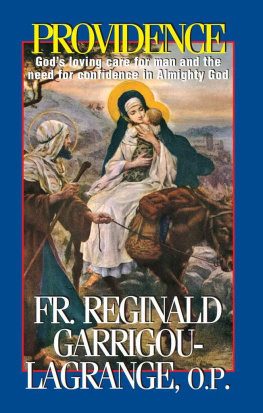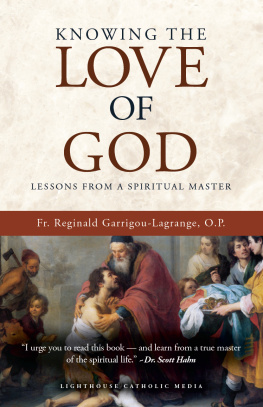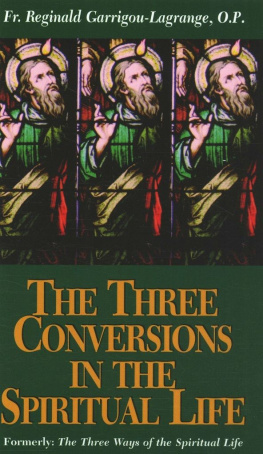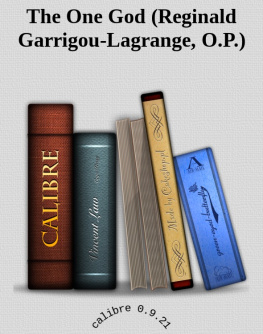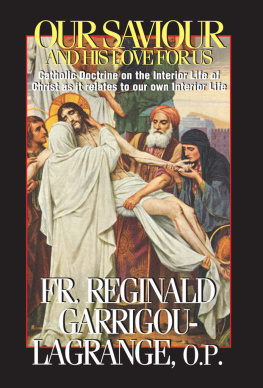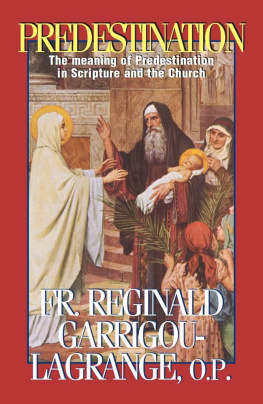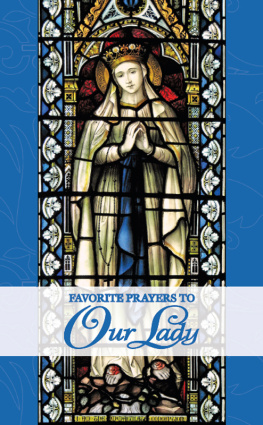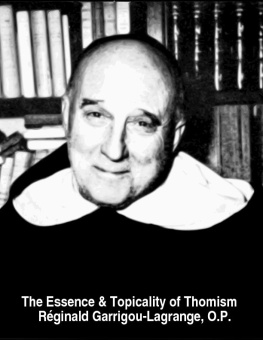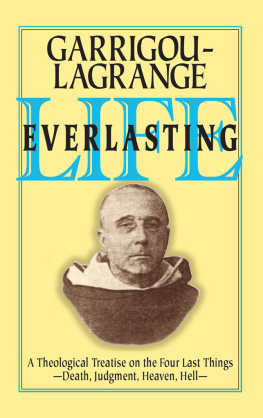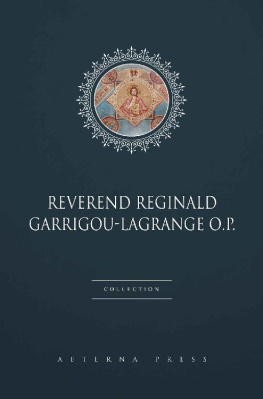Providence
Fr. Reginald
Garrigou-Lagrange,
O.P.
Copyright 1998, Fr. Reginald Garrigou-Lagrange, O.P.
To
The Holy Mother of God
Mother of Divine Grace
as a
Token of Gratitude and
Filial Obedience
FOREWORD
Having treated elsewhere of God from a purely speculative point of view, we here resume the consideration of these great questions in their relation to the spiritual life. The primary object of contemplation is, in fact, God Himself and His infinite perfections, especially His goodness, His wisdom, and His providence. Our activity and our progress toward eternity must be directed from the higher plane of this contemplation. From this point of view we shall treat here: (1) of the existence of God and of His providence; (2) of those perfections of God which His providence presupposes; (3) of providence itself according to the Old and New Testaments; (4) of a trusting self-abandonment to God's providence; (5) of providence in its relation to justice and mercy.
May these pages instil in the minds of those who read them a better understanding of God's infinite majesty and the absolute value of the one thing necessary, our last end and sanctification. Their chief aim will be to insist on the absolute and supremely life-giving character of the truth revealed by our Lord Jesus Christ and infallibly proposed to us by the Church. Souls are perishing in the ever-shifting sands of the relative; it is the absolute they need. Nowhere will they find it but in the Gospel entrusted by Jesus Christ to His Church, which has preserved, taught, and expounded it. It has been exemplified in the lives of the best of her children.
TRANSLATOR'S PREFACE
In these days of positive unbelief, agnosticism, and general indifference concerning the supernatural, it is to be hoped that this English translation of the Reverend Father Garrigou-Lagrange's La Providence et la confiance en Dieu will serve a useful purpose. In this book the author has proved conclusively to anyone of upright mind that there is an all-wise and designing Providence, who has created all things with an end in view, and this especially as regards human beings. The whole of creation confirms this view. Long ago the psalmist declared that "the heavens show forth the glory of God: and the firmament declareth the work of His hands" (Ps. 18:2). If we believe in the existence of Godand no reasonable being can deny thisthen we must say with the bard of Avon that "there's a divinity that shapes our ends, rough-hew them how we will" (Hamlet, V, ii, 10).
The first part of this book is a brief summary of a previous work by the same author, entitled: God, His Existence and His Nature. The proofs for the existence of God and a discussion of the divine attributes constitute the basis of Providence. This French work was well received. Within a short time after publication six thousand copies were sold. It has also been translated into German, Italian, and Polish.
In conclusion I wish to express my indebtedness to the Reverend Dr. Newton Thompson for his painstaking care in preparing the manuscript for publication. This indebtedness also applies to the second volume of God, His Existence and His Nature, which due to an oversight was not mentioned at the time of its publication.
I also wish to thank the Reverend Dr. Bernard Wall, late of Wonersh seminary, England, for his courtesy in allowing me the use of his manuscript, which I consulted on various occasions. The verification of many quoted passages was thereby much simplified and this enabled me to proceed more rapidly.
Bede Rose, O.S.B.
St. Benedict's Abbey
Mount Angel, Oregon
CONTENTS
PART I
THE EXISTENCE OF GOD AND OF PROVIDENCE
CHAPTER I
GOD THE PRIME MOVER OF CORPOREAL AND SPIRITUAL BEINGS
Before we proceed to consider the meaning and import of the proofs for the existence of God and His providence, it will be well to point out one general proof that virtually contains them all. It may be summed up in this way: The greater does not come from the less, the more perfect does not come from the less perfect, since the latter is incapable of producing this effect.
There are in the world living, intelligent beings that come into existence and disappear again; they are therefore not self-existent. And what we say of the present applies equally to the past.
Consequently they require a cause, one that is self-existent. Hence there must exist from all eternity a first Being who owes His being to none but Himself and is able to confer being on others: a first living being, a first intelligence, a first goodness and holiness. If it were not so, the life, intelligence, goodness, and holiness of which we have experience could never have made their appearance in this world of ours.
Already open to common sense, this proof may be further scrutinized by philosophical reason, but no fault can be found with it.
The greater cannot come from the less as from its wholly adequate, efficacious cause, for the additional perfection would itself then be without a cause, without a reason for its existence, and hence absolutely unintelligible. It is utterly absurd to maintain that the intelligence or the goodness of Jesus, of the great saintsof St. John, St. Paul, St. Augustineare the result of unintelligent matter, of a material and blind fatality.
This general proof is at once more convincing when we consider the motion of bodies and spiritsmotions from which it is shown that God is the first mover of every being, both corporeal and spiritual.
Already advanced by Aristotle, this proof from motion is set out as follows by St. Thomas in his Summa Theologica, Ia, q. 2, a. 3:
There is motion in the world, from the
lowest order of beings to the highest.
St. Thomas takes as his starting-point a fact of evident experience, that there is motion in the world: the local motion of inanimate bodies displacing and attracting one another; the qualitative motion of heat increasing or diminishing in intensity; the motion of development in the growing plant; the motion of the animal desiring food and going in quest of it; the motion of the human intellect passing from ignorance to a knowledge at first confused, then distinct; the motion of our spiritual will, which from not desiring a certain object comes to desire it more keenly; the motion of our will which after desiring the end desires also the means to attain it.
Here, then, is a universal fact: there is motion in the world, from the motion of the stone that is thrown into the air, to the motion of our minds and wills. And we may say that everything in this world is subject to motion or changenations and peoples and institutions as well as individuals. When a motion has reached its peak it gives place to another, as one wave of the sea is followed by another, one generation by another, a phenomenon that the ancients represented by the wheel of fortune on which the more successful were lifted up, only to descend once more and give place to others. Is it a fact, then, that everything passes, that nothing endures? Is there nothing constant, nothing stable and absolutely permanent?
All motion requires a mover
How are we to explain this universal fact of motion, be it either corporeal or spiritual? Is the explanation to be found in motion itself? Is it its own reason, its own cause? To answer this question, we must begin by pointing out two facts. First, in motion there is something new that requires explanation. Where does this new element come from, which previously had no existence? The question applies to past as well as to present forms of motion. Secondly, motion exists only in a movable object: it is this individual motion for the sole reason that it is the motion of this mobile object. There is no displacement without a body that is displaced, no flowing without a fluid, no current without a liquid, no flight without a bird that flies, no dream without a dreamer, no motion or volition apart from an intelligent being that wills.
Next page
